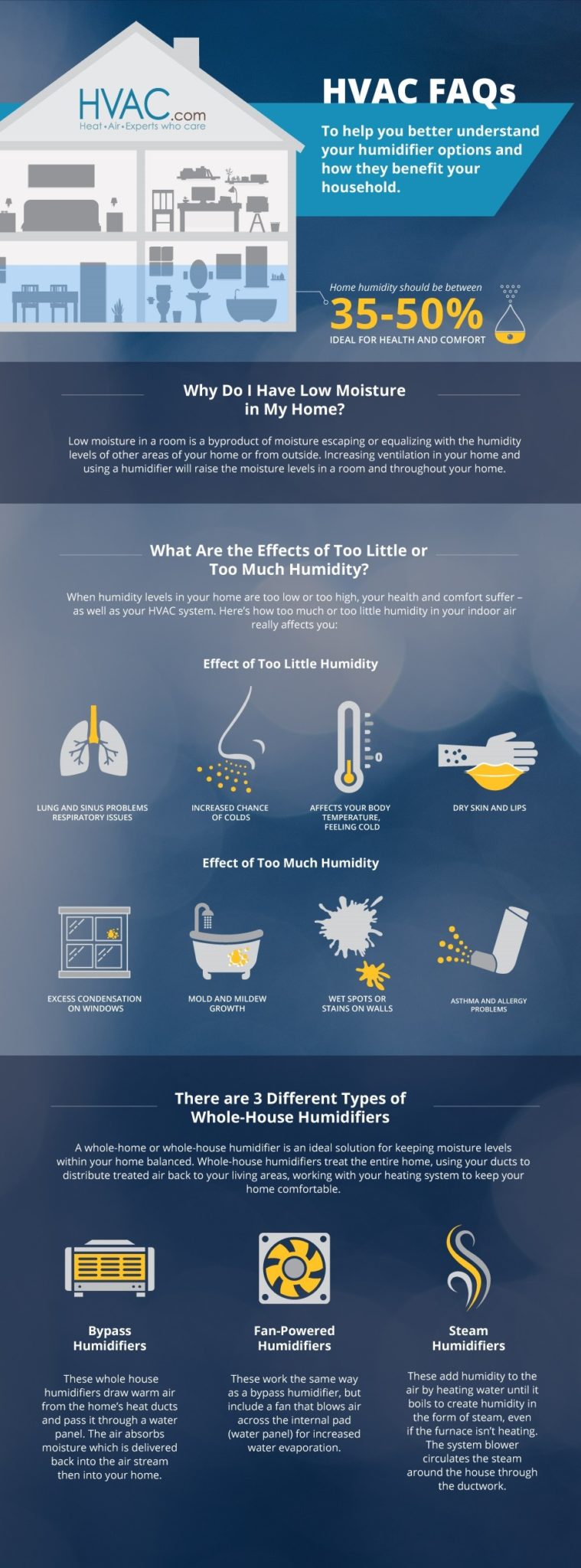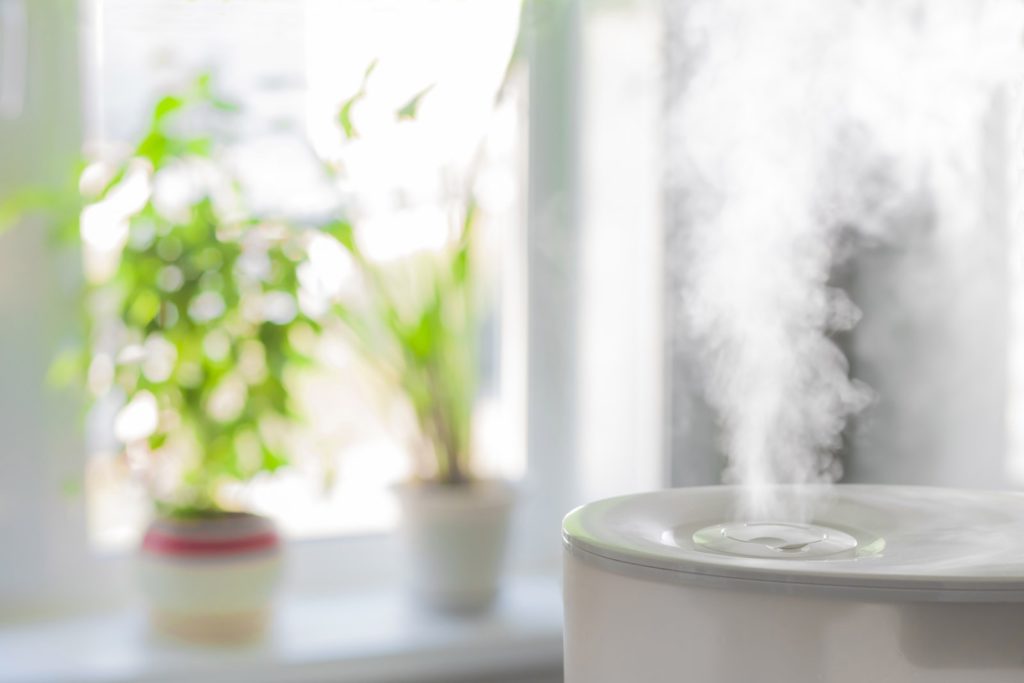HVAC FAQs: Humidifiers

Keeping the relative humidity levels in your home balanced between 35 to 50 percent is ideal for your health and comfort. Humidifiers work to add moisture to air that is too dry, maintaining this balance. Our HVAC FAQs help you better understand your humidifier options and how they benefit your household.

HVAC FAQ: Why Do I Have Low Moisture in My Room?
Low moisture in a room is a byproduct of moisture escaping or equalizing with the humidity levels of other areas of your home or from outside. Increasing ventilation in your home and using a humidifier will raise the moisture levels in a room and throughout your home.
With the installation of a whole-home humidifier, you can have it installed to work with your current heating and cooling system and not worry about turning it on or off. It’s integrated into the blower system on your furnace and draws water directly from your water supply. There are three types of whole-home humidifiers you can install:
Bypass humidifiers:
Installed on either the supply or return plenum of a forced air handling system, warm air is drawn in and passes through a water panel. Moisturized air is recirculated throughout your home using the HVAC system’s blower motor. These systems only operate when the HVAC system is running because they utilize the system’s motor.
Fan-powered humidifiers:
These humidifiers work similar to that of a bypass humidifier except they include a fan that blows air across the internal water panel for higher water evaporation. A fan-powered humidifier doesn’t require a bypass duct because of the built-in fan and can be installed in smaller spaces. These humidifiers can also run independent of the home’s heating and cooling system.
Steam humidifiers:
A steam humidifier adds moisture to the air by heating water until it boils and steam is formed. It works even when the furnace isn’t on, creating moisture indoors in the most efficient way possible. Steam humidifiers deliver a pure and natural form of moisture without compromising your indoor air quality or the energy efficiency of your current HVAC system.
HVAC FAQ: What Are the Effects of Too Little or Too Much Humidity?
When humidity levels in your home are too low or too high, your health and comfort suffer – as well as your HVAC system. Here’s how too much or too little humidity in your indoor air really affects you:
Effects of Too Little Humidity
When the humidity in your home is too low, the effects can cause health issues, such as bloody noses, increased static electricity, dry skin and lips, scratchy throats and noses, lung and sinus problems, respiratory issues, and increased chance of colds. Low humidity also affects your body temperature, producing a cold feeling all over even when the thermostat is set high. Viruses and bacteria will thrive and can cause repeated health issues for you and your family.
Low humidity causes wood floors and furnishings to shrink, separate, and warp. The wallpaper on your walls may peel around the edges and loosen, and mold may grow behind it the damaged wallpaper. The environment in your home becomes compromised when your humidity levels are too low.
Effects of Too Much Humidity
Summer is the known time for increased humidity, but the truth is that too much humidity can be a problem regardless of the season. A home with high humidity levels will exhibit problems with excess condensation on windows, wet spots or stains on walls and ceilings, musty smells, and mold in bathrooms and other high-moisture areas. High humidity is the leading cause of mold and mildew growth in a home, causing health concerns such as increased asthma and allergy problems.
A home with too much humidity combined with high temperatures can lead to heat stroke, especially for those with heart problems. The structure of your home can become compromised by too much humidity. It will begin to rot, and pests will become a nuisance if you live in the South.

HVAC FAQ: Different Types of Whole-House Humidifiers
A whole-home or whole-house humidifier is an ideal solution for keeping moisture levels within your home balanced. When there is too little moisture in the air, the humidifier works to add humidity, bringing your home up to the correct humidity level. Whole-house humidifiers treat the entire home, using your ducts to distribute treated air back to your living areas, working with your heating system to keep your home comfortable.
Here are the different types of whole-house humidifiers:
Bypass Humidifiers
Bypass Humidifiers add moisture to the warm air from a furnace. These whole house humidifiers draw warm air from the home’s heat ducts and pass it through a water panel. The air absorbs moisture which is delivered back into the air stream then into your home. Bypass humidifiers can be installed on either the Supply or Return plenum of a forced air handling system. For those who don’t have a floor drain, there is a Drainless Bypass Humidifier available. These drainless styles recirculate their own water, minimizing water usage.
Fan-Powered Humidifiers
Fan-Powered Humidifiers work the same way as a bypass humidifier, but include a fan that blows air across the internal pad (water panel) for increased water evaporation. Power humidifiers can generally produce a gallon more of humidity each day compared to the bypass humidifier. The electricity required for the internal fan equals that of a 25-watt light bulb. Powered flow-through systems don’t require a bypass duct, therefore they can be installed in smaller spaces. Power whole house humidifiers are perfect for homes built on slabs or with HVAC systems in a closet.
Steam Humidifiers
Steam Humidifiers add humidity to the air by heating water electrically until it boils to create humidity in the form of steam even if the furnace isn’t on. The steam is picked up by the system blower then pushed throughout the home vents. Steam humidifiers offer the fastest and most efficient method of increasing and maintaining the appropriate and comfortable level of humidity in your home. Additionally, steam whole house humidifiers deliver a pure and best natural form of humidity that’s introduced through your entire home. Steam humidifiers will run moisture as needed, regardless your current heating or air conditioning situation.
HVAC FAQ: Why Install a Humidifier with My Home Furnace?
When you install a whole-home humidifier to work with your furnace, you’ll gain many advantages from improved comfort to better control over relative humidity levels indoors. These efficient humidifiers use little energy while treating all over the home.
Here are a few of the priceless benefits you’ll gain when you install a whole-home humidifier:
- Health improvements from treating dry air throughout the home. Home furnace humidifiers have been shown to improve lung health, alleviate allergy and asthma symptoms, and lessen instances of illness.
- Improving home comfort during colder months. Proper humidification of the home can make the space feel warmer with lower temperatures. The minor amount of energy consumed by the home furnace humidifier leads to a great savings in energy consumed by the heating system to keep the home warmer when air is drier, saving users money.
- Protection of the home. When humidity levels in the home are kept balanced by a furnace humidifier, the damaging effects of dry air are kept at bay. Wood flooring, cabinets, furniture, and other fixtures are protected from cracks and drying out. Static electricity in the home is also reduced when air is properly moisturized.
HVAC FAQ: What Kind of Humidifier Do I Need?
In addition to the whole-home humidifiers discussed above, portable humidifiers are another solution you can use to add needed moisture to your air. Consider the following when you ask yourself, “Which type of humidifier do I need?”:
- A whole-home humidifier is the best option if you require moisture in several rooms in your home. It is installed directly into your furnace and can be operated via the furnace’s blower or its own blower. A whole-home humidifier comes in several forms and depends on how much space you have on your furnace.
- Portable humidifiers will give you added moisture to a room that is lacking humidity, but you need to buy one that will cover the square footage of the room it will be used in. If you buy a portable unit that is too small, you won’t feel a difference in your moisture levels and will have wasted money on something that isn’t helping you.
The different portable humidifiers to choose from are:
- Cool mist humidifiers emit a cool vapor to add more moisture to a room.
- Evaporative humidifiers are similar to a cool mist humidifier, but they use a fan to circulate humidity in a room.
- Ultrasonic humidifiers produce water droplets via a vibrating metallic diaphragm.
- Vaporizer humidifiers can be either cool or warm mist, and inhalants can be added to treat flu and cold ailments.
- Warm mist humidifiers heat water to create vapor that is cooled before it is added to a room’s air.
Get Answers to Your HVAC FAQs from a Local HVAC Contractor
Working with a trusted, local heating, cooling, and indoor air quality contractor is the best way to learn the answers to humidifier HVAC FAQs specific to your home. Your contractor will diagnose the moisture issues you face indoors and provide reliable solutions that will keep humidity levels always balanced within your home.
HVAC.com makes it easy for you to find a qualified HVAC company near you with our HVAC Contractor Directory. By entering your ZIP code into the search bar, you’ll receive a complete listing of all local heating and cooling companies nearby, including all the company information you need to choose the best professional for your needs.